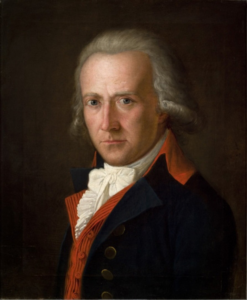The shades
(Poet's title: Die Schatten)
Set by Schubert:
D 50
[April 12, 1813]
Freunde, deren Grüfte sich schon bemoosten!
Wann der Vollmond über dem Walde dämmert,
Schweben eure Schatten empor vom stillen
Ufer der Lethe.
Seid mir, Unvergessliche, froh gesegnet!
Du vor allen, welcher im Buch der Menschheit
Mir der Hieroglyphen so viel gedeutet!
Redlicher Bonnet!
Längst verschlürft im Strudel der Brandung wäre
Wohl mein Fahrzeug oder am Riff zerschmettert,
Hättet ihr nicht, Genien gleich, im Sturme
Schirmend gewaltet.
Wiedersehn der Liebenden! wo der Heimat
Goldne Sterne leuchten, o du der armen
Psyche, die gebunden im Grabtal schmachtet,
Himmlische Sehnsucht.
Friends whose tombs are already covered in moss!
When the full moon sets over the forest
May your shades hover as they come from the calm
Bank of Lethe.
Let me give you a happy blessing, unforgettable ones!
Most of all you, who in the book of humanity
Made sense of so many hieroglyphs,
Honest Bonnet!
Long ago the foaming whirlpool would have
Overturned my vessel, or it would have shattered on a reef,
Had it not been for you in the storm, like a genie,
Managing to protect me.
The farewell of lovers! where home’s
Golden stars shine, oh longing of poor
Psyche, languishing, bound in the valley of the grave;
Heavenly longing!
All translations into English that appear on this website, unless otherwise stated, are by Malcolm Wren. You are free to use them on condition that you acknowledge Malcolm Wren as the translator and schubertsong.uk as the source. Unless otherwise stated, the comments and essays that appear after the texts and translations are by Malcolm Wren and are © Copyright.
☙
Themes and images in this text:
Boats and ships Books Egypt Farewell and leave taking Flying, soaring and gliding Gold Graves and burials Heaven, the sky Home (Heimat) Lethe Moss Night and the moon On the water – rowing and sailing Psyche Rivers – waterfalls, rapids and whirlpools Shade and shadows Stars Storms Under the water, sinking and drowning Valleys Woods – large woods and forests (Wald)
Matthisson could not have known in the 1790’s that hieroglyphs were soon to be deciphered. The Rosetta stone was discovered by the French expeditionary army in 1799 and it was decoded within a generation (Champollion announced his findings in 1822). For us (or even for the later Schubert, after he had set this text) the idea of ‘explaining the meaning of hieroglyphs inscribed in the book of humanity’ cannot be what it was for Matthisson. We have to imagine a truly occult power, a profound mystery that will never be accessible to a wider public.
The metaphor of human life being recorded in a book is at least as old as the Book of Revelation, where the seals are broken and the books (on scrolls at that time) are read. What must it have been like to be aware of unreadable scrolls (such as copies of what we now know to be the Egyptian Book of the Dead) and to imagine cracking the code? This is the sort of ability that Matthisson ascribes to Charles Bonnet, the poet’s botanist friend, who had died in 1793.
In a sudden shift of metaphorical reference Bonnet is then thanked for providing protection against ‘the storms of life’ and helping the poet to avoid ‘a shipwreck’. Life is a journey rather than a hermetic book. We are threatened by storms, and by other hazards (whirlpools, white water, reefs). Even here Bonnet’s help was invaluable; he presumably offered wise advice with the navigation and steering (and, it could be inferred, may even have had some influence with the elements).
However, he has now arrived at a place where the mysteries will not be solved, where the destination remains forever unattainable. Although he has only recently died his tomb is already covered in moss. He is well and truly dead. It is only his shadow that might hover at night. His soul (Psyche) is locked in a perpetual longing for an unreachable homeland. The final strophe of the poem introduces this yearning with the ambiguity of ‘Wiederseh’n’ (literally ‘seeing again’): we say farewell (‘auf Wiedersehen’) by looking forward to a future meeting that may not happen.
☙
Original Spelling and note on the text Die Schatten Freunde, deren Grüfte sich schon bemoosten! Wann der Vollmond über dem Walde dämmert, Schweben eure Schatten empor vom stillen Ufer der Lethe. Seid mir, Unvergeßliche, froh gesegnet! Du vor allen, welcher im Buch' der Menschheit Mir der Hieroglyphen so viel gedeutet, Redlicher Bonnet! Längst verschlürft im Strudel der Brandung wäre Wohl mein Fahrzeug oder am Riff zerschmettert, Hättet ihr nicht, Genien gleich, im Sturme Schirmend gewaltet. Wiedersehn der Liebenden! wo der Heimath Goldne Sterne leuchten, o du der armen Psyche, die gebunden im Grabthal schmachtet, Himmlische1 Sehnsucht! 1 Schubert changed 'Heiligste' (Most sacred) to 'Himmlische' (Heavenly)
Confirmed by Peter Rastl with Schubert’s possible source, Sammlung deutscher Beyspiele zur Bildung des Stils. Zweyter Band. WIEN, gedruckt mit Johann Thomas Edlen von Trattnernschen Schriften. 1806. page 59; with Gedichte von Matthisson. Fünfte vermehrte Auflage. Zürich, bei Orell, Füssli und Compagnie. 1802, pages 64-65; and with Gedichte von Friedrich von Matthisson. Zweiter Theil. Tübingen, bei Cotta, 1811, page 103.
First published in Musen-Almanach für das Jahr 1799, herausgegeben von Schiller, Tübingen, in der J.G.Cottaischen Buchhandlung, page 143 (only stanza 1-3).
To see an early edition of the text, go to page 59 [65 von 262] here: http://digital.onb.ac.at/OnbViewer/viewer.faces?doc=ABO_%2BZ159651303


